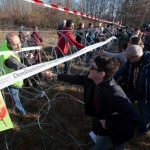ZAGREB, January 23, 2019 – Croatian Interior Minister Davor Božinović met with his Albanian and Montenegrin counterparts, Sander Lleshaj and Mevludin Nuhodžić, in Zagreb on Tuesday, discussing cooperation in preventing illegal migration.
Speaking to the press after the meeting, Božinović said that they had agreed on “more or less everything” and that now they needed to “implement what will raise our cooperation to a higher level and increase our resilience to challenges.”
The meeting was the continuation of dialogue that was stepped up last year, particularly about migration which has intensified on the Eastern Mediterranean or Western Balkans route since the end of 2017.
Božinović said that Croatia, as an EU member, had also stepped up dialogue with European institutions to draw attention to the importance of the southeast of Europe when it came to illegal migration.
Until last year, European institutions had mostly been focused on the Central Mediterranean migration route towards Italy and the Western Mediterranean route towards Spain, Božinović said, adding that they had realised then that they should also concentrate on the Western Balkans as the only land route and its potential to be used by the largest number of migrants.
The three ministers exchanged information on migration, saying that all three countries had recorded increases in the number of illegal migrants. In Croatia, their number is nearly 70 percent higher than in 2017. Lleshaj said that Albania had recorded six times more migrants than in 2017, and Nuhodžić said that Montenegro had also recorded an increase.
“Albania and Montenegro are very important to us because the illegal migrants who reach these countries soon turn up on the Croatian border, either with Serbia or more often and in greater numbers on the border with Bosnia and Herzegovina,” Božinović said.
Last year Croatia recorded 619 cases of human trafficking, an increase of 71 percent over 2017.
Božinović said that they also discussed the change in the structure of migrants, adding that most of the migrants who had reached the three countries came from Afghanistan, Pakistan, Iran and Iraq. He said this meant that in most cases these people could not be described as refugees because they were mostly economic migrants trying to reach their destinations in Western Europe.
“On the one hand this is legitimate, but on the other, given the policy of the EU which wants to stop illegal migration and which is increasingly investing in the protection of its external borders, it’s something that we have to cope with,” Božinović said. “These are the issues we will have to cope with in the decades to come. No country can deal with this alone and that’s why cooperation is needed on a regional and wider level, either European or global,” he added.
Božinović said that the countries of Southeastern Europe, which are candidates for EU membership, should not be ignored in discussions on these issues. He said that some of the initiatives had produced concrete results, adding that Bosnia and Herzegovina and Montenegro had for the first time been granted funding from the EU to increase their border control capacity.
Recalling that earlier this month the European Commission had approved a 100-million-euro fund for operational cooperation in fighting human smuggling, Božinović said that one of the criteria for receiving funding was a joint application by member states and third countries.
The three ministers also discussed the possibility of Albania and Montenegro using funding from pre-accession funds.
Lleshaj said it was most important to concentrate on the scale of illegal migration in Albania to reduce the flow of migrants to the EU. “We know that if we close the land border the flow will be diverted across the sea border. If we take all these facts into account, we are ready to strengthen trilateral cooperation. With Croatia’s mentorship, we could have better access to EU funding,” the Albanian minister said.
Nuhodžić said that migration challenges continued to have a global dimension and that no country could effectively combat illegal migration without cooperating with other countries. “All three countries, being NATO members, share security risks and have an obligation to coordinate their activities in tackling these challenges,” the Montenegrin interior minister said.
More news on the migrant crisis in the region can be found in the Politics section.









